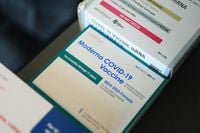This fall, vaccine access across the United States is undergoing a profound transformation, with state governments stepping into a void left by federal agencies in flux. As the Food and Drug Administration (FDA) and Centers for Disease Control and Prevention (CDC) restrict eligibility for COVID-19 boosters and overhaul advisory panels, states from New York to California are forging their own paths—sometimes in direct defiance of federal policy. The result is a patchwork of rules and coalitions that could determine who gets vaccinated, where, and when.
In early September 2025, the FDA limited eligibility for the new round of COVID-19 booster shots to adults 65 and older or those with underlying health conditions. Healthy adults and children now must seek a prescription outside of federal recommendations if they wish to be vaccinated. This abrupt change, according to The Center Square, triggered immediate concern among state leaders and public health officials, prompting a flurry of state-level actions to preserve, or even expand, vaccine access.
New York moved swiftly, declaring a statewide disaster emergency on September 6 to ensure COVID-19 vaccines would remain available. Massachusetts, meanwhile, enacted requirements for insurers to cover vaccines recommended by the state Department of Public Health—not just those sanctioned by federal agencies. “In Massachusetts, we will not let Donald Trump or Robert Kennedy get in the way of patients, and the care, and the treatments and the medication that they want and need,” Governor Maura Healey announced at a press conference, as reported by MassLive. The Massachusetts Division of Insurance and Department of Public Health also issued a bulletin requiring insurers to cover respiratory virus vaccines, including COVID, flu, and RSV, as well as routine childhood shots like measles and chickenpox, if recommended by state officials.
New Mexico, facing uncertainty over whether pharmacists could continue to administer COVID shots, issued a public health order ensuring that pharmacies could distribute vaccines without interruption. “New Mexico can’t wait,” said Gina DeBlassie, cabinet secretary for the New Mexico Department of Health, according to The Washington Post. “We’re removing barriers to make sure access continues. Vaccines will arrive this month, and we want them available to anyone who needs them.”
On the West Coast, a historic coalition emerged. On September 3-4, California, Washington, Oregon, and Hawaii launched the West Coast Health Alliance to provide immunization recommendations amid what state leaders described as a federal politicization of science. “The CDC has become a political tool that increasingly peddles ideology instead of science, ideology that will lead to severe health consequences,” declared California Governor Gavin Newsom, Washington Governor Bob Ferguson, and Oregon Governor Tina Kotek in a joint statement, as reported by The Center Square. Hawaii joined the alliance just 24 hours after its initial launch. The alliance’s stated mission is to create health guidelines informed by “trusted scientists, clinicians, and other public health leaders.”
These regional moves are a direct response to deepening turmoil at federal agencies. Earlier in 2025, the CDC’s Advisory Committee on Immunization Practices (ACIP), long the gold standard for vaccine guidance, was entirely replaced by Health and Human Services Secretary Robert F. Kennedy Jr.—a figure with a long history of vaccine skepticism. The White House also appointed Jim O’Neill, a non-physician, as interim CDC director, replacing Susan Monarez, who, according to her lawyers, was fired for refusing to “rubber-stamp unscientific, reckless directives and fire dedicated health experts.”
Many state leaders and public health officials have voiced alarm at what they see as a federal abdication of scientific rigor. Dr. Jeffrey Koplan, former CDC director, summed up the sentiment: “That body had been an incredible group of experts. To replace them with people who are not experts is terrible.” In Massachusetts, Governor Healey was even more direct: “Under the Trump administration, the CDC has been hijacked by people like Robert Kennedy—people who don’t believe in science and people who don’t believe in science-based health care.”
At the same time, federal agencies have experienced staff and budget cuts, further eroding trust. The CDC’s revamped ACIP has delayed issuing updated recommendations for fall COVID vaccines, leaving states in limbo. Because many state vaccine laws are tied directly to ACIP guidance, this delay has caused confusion for school entry requirements, health worker vaccination protocols, and pharmacists’ ability to administer vaccines.
To fill the gap, states are building their own guidance systems. While still referencing the CDC’s ACIP, they are now also consulting the American Academy of Pediatrics, the American College of Obstetricians and Gynecologists, and new initiatives like the Vaccine Integrity Project at the University of Minnesota. “We’re not removing ACIP as a source,” DeBlassie clarified, “but we’re going to include other medical organizations to ensure our decisions are evidence-based.” California’s Dr. Erica Pan echoed the urgency: “Vaccines are one of the most important public health interventions in our lifetimes. We want to make sure we continue to protect our communities.”
The political divide is stark. Democratic-led states are pushing to preserve or expand vaccine access, while some Republican-led states are moving in the opposite direction. On September 3, Florida’s Surgeon General Dr. Joseph Ladapo called COVID vaccines “poison” and announced plans to dismantle all vaccine requirements. “Who am I as a man standing here now to tell you what you should put in your body?” Ladapo said, as quoted by CNN. Governor Healey responded, “I think Ron DeSantis is putting politics over public health. I think a lot of people are going to think twice about going to Florida. I don’t think measles was a souvenir that you were looking to return with after a trip to Disney World.”
The consequences of this new patchwork are already apparent. Pharmacies like CVS and Walgreens have limited access to COVID shots in states like Massachusetts due to the regulatory environment, though Massachusetts quickly issued standing orders to allow pharmacists to resume vaccinations. Children under five can still receive shots from their pediatricians, but the shifting rules have left many families and providers uncertain about eligibility and coverage.
Meanwhile, public opinion in some states remains strongly in favor of robust vaccine policy. A recent poll from Massachusetts Families for Vaccines found that 70% of registered voters support eliminating the religious exemption for school immunizations, with the vast majority believing childhood vaccines are safe and effective.
As the CDC’s new advisory committee prepares to meet later in September to issue recommendations for COVID, Hepatitis B, and other vaccines, many states have signaled they will make their own decisions regardless of federal guidance. The West Coast Health Alliance is expected to finalize shared principles to strengthen public confidence in vaccines and public health, while Massachusetts and its Northeast neighbors are working toward a regional collaborative for evidence-based recommendations.
For public health leaders, the stakes could not be higher: a reliable national vaccine strategy has given way to a landscape where access may depend on state lines. Supporters of state-led action argue that local governments are stepping up to safeguard science-based decision-making where federal institutions have faltered. Critics warn of fragmentation, inequity, and confusion. As Dr. Pan put it, “I’m sad that we’re in a place where we have to do this. But our communities can’t wait.”


